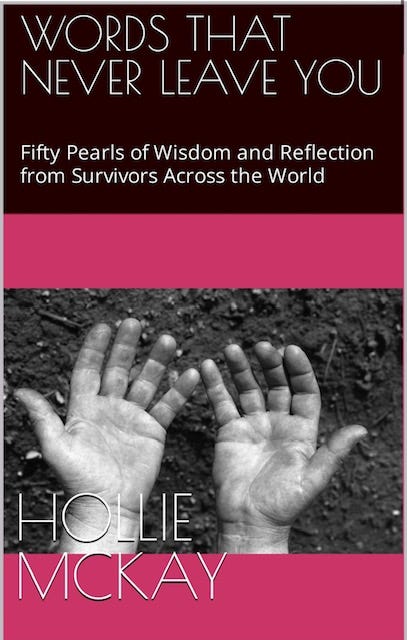Words that Never Leave You: “I am not going to take that on. That is on them.”
Part Twenty-Two in an ongoing series from Hollie's book "Words That Never Leave You: Fifty Pearls of Wisdom and Reflection from Survivors Across the World."
The searing memories of torture still haunt Mohammed Soltan. His father “disappeared” months ago into an Egyptian prison. Intelligence officials informed him that prison guards broke his dad’s jaw and teeth, screaming that he must pay the price for his son’s “treachery.” Yet Mohammed, a former prisoner of conscience from Egypt, remains steadfast in speaking out. He will not wear the weight of guilt that his dad is suffering because of his vocal activism against the military leadership in Cairo.
Mohammed’s venture into the labyrinth of political activism was by default. He grew up in what he describes as simple, rural American life in the Midwest — white picket fences, sprinkler summers, and frosty winters. But when the 2011 Arab Spring erupted in Egypt, the place of his heritage, Mohammed wanted to experience what he hoped would be real change in his ancestral homeland.
“I remember watching the protests in my history class at Ohio State University and just knowing that I needed to be there,” Mohammed remembered. “I left the airport and went straight to Tahir Square. It was February 11, and longtime President Hosni Mubarak stepped down. It seemed like the whole trajectory of my life had changed. It seemed like a dream. The young people of Egypt had spoken, and we had taken our country back.”
Only his dream of freedom quickly descended into a nightmare. After completing his studies in the U.S., Mohammed moved with his father to Egypt in March 2013 to build a life working with the newly elected Mohamed Morsi leadership. However, just a few months later, Egyptians poured into the streets to showcase their displeasure at Morsi, setting up a succession of clashes. But the summer flared with the heat of protests and confusion swarming the streets, both in support and objection to the Army’s government overhaul.

Then, Egyptian authorities burst through Mohammad’s family home. Authorities carted him away in what would amount to months of beatings. Cigarette burns melted Mohammad’s unwashed flesh, he listened to the cracks of his bones breaking, and lived with the gut-wrenching sensation of his left shoulder dislocating from his deltoid muscle.
Mohammad remembers torturers pressing nails into his laid-to-waste frame during regular torture sessions. He remembered how his angst would spew into anger every time authorities attempted to force-feed him. Each time, Mohammad would tear the IV drip out of his weakening body.
While behind bars, Mohammed launched a hunger strike that stretched from months to more than a year. As an American, Mohammed had a robust government that could demand his release. Finally, after twenty-two months – including 489 days on a hunger strike, wrapped in despair – he was set free into the sunshine on May 31, 2015. But as any torture survivor will tell you, there’s never really a place to call home.
Authorities subsequently retaliated tof Mohammed’s release by arresting five of his cousins and father.
Along with the deep pangs of knowing that his dad is still out there in the darkness of the dungeons, alone and in misery, Mohammed still frantically jumps at the sound of keys shaking or doors slamming — sounds that signified the guards coming into his cell for another round of biting games. His stomach violently rejects heavy meals, and being alone comes with a bundle of distressing solitary confinement reminders.
But when I asked Mohammed if he struggles with the knowledge that his daring outspokenness has made his dad’s disappearance worse, he straightens up.
“I am not going to take that on,” he insists without skipping a beat. “That is on them.”
What power – and self-preservation – to know what is and what is not our remorse to withstand.
PURCHASE YOUR COPY OF “WORDS THAT NEVER LEAVE YOU” TO READ MORE REFLECTIONS AND ANECDOTES
** Short read of meaningful lessons gleaned from the ordinary forced to become extraordinary
For speaking queries please contact meta@metaspeakers.org
I am also available for a select number of private coaching sessions for those wishing to write a book or venture into the foreign journalism space. Please contact directly for rates hollie@holliemckay.com
PLEASE CONSIDER A PAID SUBSCRIPTION TO THIS SUBSTACK TO KEEP INDEPENDENT JOURNALISM ALIVE.



